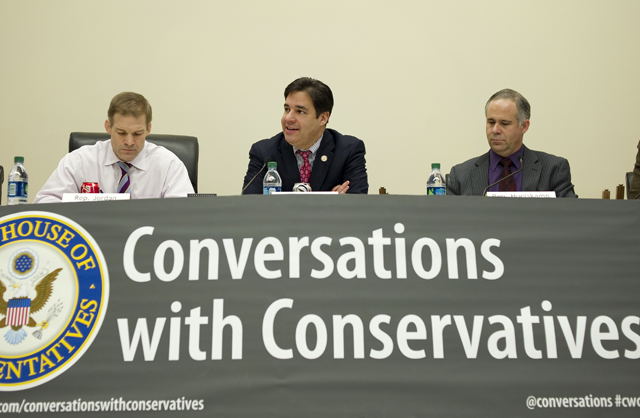House conservatives expressed disagreement and disappointment with the Senate-House budget deal at today’s “Conversations with Conservatives” hosted by The Foundry on Capitol Hill.
The deal, brokered by Senate Budget Committee Chairman Patty Murray (D-WA) and House Budget Committee Chairman Paul Ryan (R-WI), was a bipartisan compromise.
One of the most outspoken members on today’s panel, Representative Raul Labrador (R-ID), said of the budget deal, “I haven’t decided if I’m going to be a really strong no or just a no.”
The two-year budget deal, which was released Tuesday night, calls for $1 trillion in federal spending in 2014 while replacing some sequestration cuts. While it promises savings later, it calls for more spending now—something many conservatives have a big problem with.
One reason some are so vehemently opposed is because it doesn’t just delay savings, it pushes it nine or 10 years down the road.
The only person on the panel dedicated to voting “yes” on the deal was Representative Vicky Hartzler (R-MO), who still expressed skepticism about the direction of the deal, saying it was not “preferable” but “does achieve some…goals without raising taxes.”
Many on the panel disagreed with Hartzler’s position, and as Heritage pointed out today, “raising revenue to spend more is simply taxing and spending.”
Labrador noted that the deal is nothing but “empty promises.”
Most Members on the panel are outspoken on reducing Washington’s out-of-control spending, and this budget deal does not rein that in. Additionally, it raises Transportation and Security Administration fees—yet another burden on the American people.
“Since August 2011, the debt ceiling was raised to the tune of $3 trillion,” said Representative Tim Huelskamp (R-KS). “What have conservatives gotten in exchange for that?”
Washington has a spending problem, yet this budget deal is another step towards more spending. Representative Mick Mulvaney (R-SC) summed it up:
The debate about the debt ceiling needs to be about whether or not the we solve the problems that give rise to the debt ceiling issue in the first place…Now we’ve raised the debt ceiling over $1 trillion this year without a single penny of spending reductions….we’re not doing anything at all about the underlying problem.
While the deal was cut seemingly to avoid gridlock again, it’s clear that those in opposition have no plans to remain silent.




























